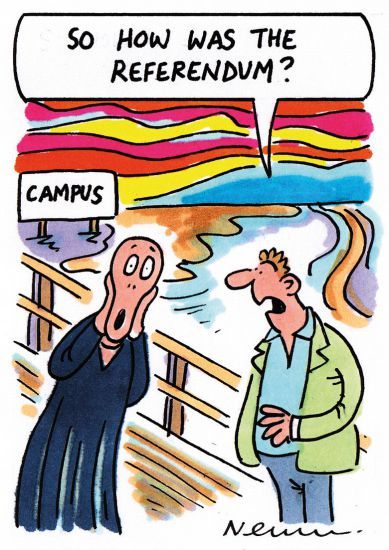
“Can I class Brexit as a traumatic event when [I] fail my exams next week? Because honestly I’m so distracted now because of it.” That post on The Student Room website was not a one-off incident of “Brexit stress”, with many pro-European Union students stating that they felt “genuinely depressed” by the referendum result, according to the Daily Mail on 29 June. “I’ve felt so down all day because of this, and just have this constant sick feeling in my stomach,” wrote one student, while another said that it “took an hour for my hands to stop shaking”. Others hit out at older generations for “ruining their future” by opting for Leave, although it seems that voter turnout among students may have been lower than expected. Speaking from a BBC Question Time audience on 30 June, a students’ union activist at the University of Central Lancashire admitted that only 30 per cent of her students may have turned out to vote.
It wasn’t just students who were upset at Brexit, with one academic arriving naked at a University of Cambridge faculty meeting to protest against the referendum result, The Daily Telegraph reported on 1 July. Economist Victoria Bateman had written on her breasts and stomach “Brexit leaves Britain naked” before she walked into the Faculty of Economics’ meeting on 29 June, the paper said. Dr Bateman, who posed for a nude portrait exhibited at a London gallery last year, sat undressed throughout the two-hour meeting, attended by about 30 college directors of studies, without anyone mentioning her nudity, the paper added. It is one thing “to pose naked and another to show up naked”, said an academic who attended the meeting, noting that they nevertheless “managed to get through the agenda”. “This was a standard meeting about the teaching of economics and we moved away from her state of dress,” the source added.
Machiavellian plotting is par for the course in post-Brexit UK politics, but the actions of one Australian vice-chancellor may eclipse even the murky manoeuvres of Westminster MPs. According to a report by a state corruption watchdog, Murdoch University head Richard Higgott engaged in “serious misconduct” as he plotted to appoint a close personal friend as his deputy at the Perth institution, ABC News reported on 1 July. Professor Higgott “actively deceived” other members of a recruitment panel that he led by “secretly whittling down the field of 12 candidates to his preferred and eventual appointment Margaret Ann Capling”, the site said. The former University of Warwick pro vice-chancellor, who resigned as Murdoch vice-chancellor in October 2014, also held secret meetings with Professor Capling to tailor the job description to her profile and failed to declare their close friendship; personal emails uncovered between the two professors contained terms of endearment, such as “Your Higginess”, “My dearest Higgy” and “Capling my dear”, the report said.
A lecturer told to “get back to Africa” has been praised for standing up to foul-mouthed youths, The New York Times reported on 29 June. Juan Jasso, a 39-year-old lecturer in sport at Manchester Metropolitan University, faced a barrage of racist abuse after he asked two men on a Manchester tram on 28 June to stop swearing, the paper said. Mr Jasso, a Mexican-American who has lived in the UK for 18 years, had beer thrown over him during the racist tirade, which was captured on video. The US Army veteran, one of many immigrants who faced xenophobic attacks after the European Union referendum, has won much praise for his cool resolve under fire, with one local newspaper nicknaming him “SuperJuan”. However, Mr Jasso said that he was a Brexit supporter, although he was unable to vote. “The xenophobia that has followed the attack hasn’t changed my view,” he said.
Malia Bouattia’s speech at an impromptu pro-Jeremy Corbyn rally did not go down well with all left-wing activists. Addressing a crowd in Parliament Square on 27 June, the new president of the National Union of Students explained that she was “not a Labour member” and added “[I] don’t plan on becoming one any time soon”, to jeers of “shame”. But she explained that she was against the anti-Jezza coup because the Labour leader was “one of the few politicians in this country who has consistently opposed austerity and the rise of racist and xenophobic policies”. Whether Ms Bouattia’s backing for Mr Corbyn will help to quickly bring the riven student movement together remains to be seen, but like divisions generally in post-Brexit vote Britain, it seems unlikely.
Register to continue
Why register?
- Registration is free and only takes a moment
- Once registered, you can read 3 articles a month
- Sign up for our newsletter
Subscribe
Or subscribe for unlimited access to:
- Unlimited access to news, views, insights & reviews
- Digital editions
- Digital access to THE’s university and college rankings analysis
Already registered or a current subscriber?



